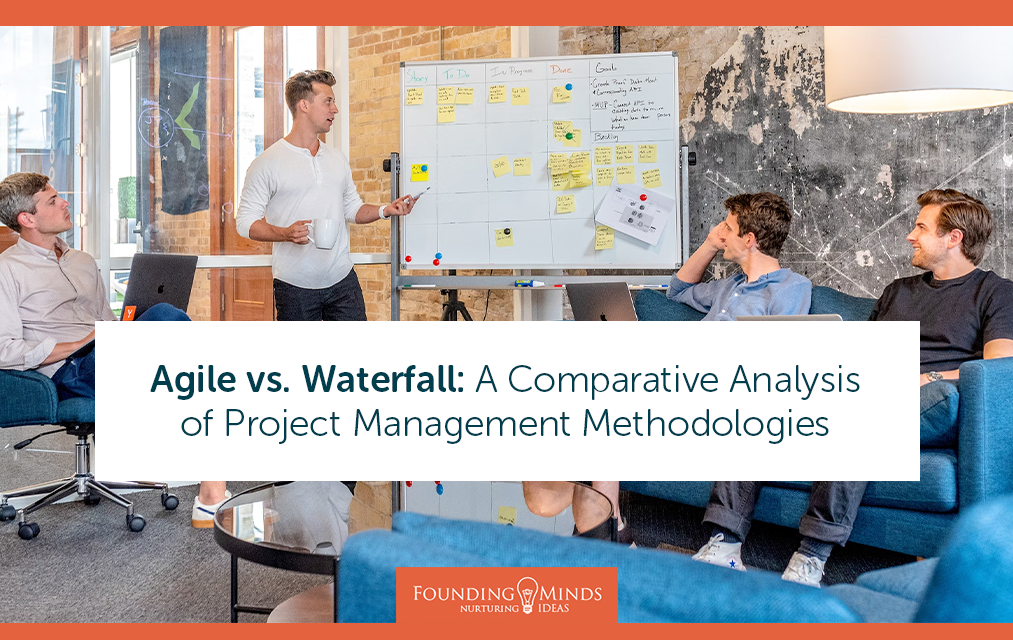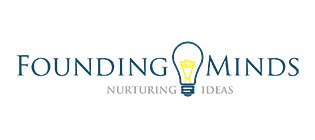
When you’re thinking about managing a project, it can be tough to figure out whether to use the agile or waterfall methodology. At Founding Minds, we always make a decision based on the team makeup, expertise, and cultural fit of the project. There’s no one-size-fits-all solution – a project manager needs to understand the best use cases for each methodology and compare every aspect of the project before choosing the right approach.
Waterfall Methodology
Waterfall methodology is a linear and sequential approach to project management. It follows a structured process that includes planning, design, implementation, testing, and maintenance, and each phase must be completed before moving on to the next. This method works well for large-scale projects with well-defined requirements and stable teams, but if risk tolerance is low, it might be the way to go.
Agile Methodology
On the other hand, Agile methodology is an iterative and flexible approach that emphasizes collaboration, adaptability, and continuous feedback. It’s often used for complex projects that require innovation and collaboration, and it’s a good fit if the customer has subject matter expertise and time to spend with the team.
Strategic Understanding of Waterfall and Agile
Choosing between Agile and Waterfall depends on the specific needs of your project. Project managers must weigh each methodology against the team makeup, expertise, and culture of the project. Agile and Waterfall both have their own advantages and disadvantages, so it’s crucial to carefully consider each strategy before making a decision.
At Founding Minds, we know how important it is to create a leadership culture that reflects effective consideration of all stakeholders and how a Waterfall or Agile approach will shape the engagement and the end goals.
Here are some key points to compare Agile and Waterfall:
-
Approach to Delivering Projects:
- Agile adopts an iterative methodology that involves short cycles of planning, execution, and review. It focuses on delivering smaller portions of the project incrementally, incorporating feedback from stakeholders and customers throughout the development process.
- Waterfall follows a more linear and sequential approach, with each phase of the project completed in a specific order, emphasizing upfront planning and finalizing each phase before moving on to the next one.
-
Flexibility and Adaptability:
- Agile methodology allows development teams to adjust to changing requirements and circumstances. It focuses on continuous improvement, collaboration, and communication between team members.
- Waterfall is less flexible and adaptable, making it more suitable for projects with well-defined requirements and predictable outcomes. This is because once a phase is completed, it is difficult and costly to revisit it.
-
Customer/Stakeholder Feedback:
- Agile methodology places a strong emphasis on incorporating feedback throughout the development process. This is achieved by delivering smaller, incremental pieces of the project, allowing development teams to make adjustments based on feedback received. The result is a more customer-centric approach to development that is likely to lead to higher levels of satisfaction.
- Waterfall methodology does not prioritize feedback until the end of the project, which may result in customers feeling dissatisfied with the final outcome.

-
Project Planning:
- Agile methodology takes an iterative approach, with each cycle focusing on the next set of deliverables. While requirements and timelines are determined at the start of the project, they are subject to change throughout based on feedback from the customer and team input.
- Waterfall methodology plans everything upfront, including all requirements, timelines, and budgets. Any changes to the plan are discouraged, and deviations may result in delays or cost overruns.
-
Risk Management:
- Agile methodology identifies and addresses risks continuously throughout the project, with contingency plans adjusted based on feedback and results from each iteration.
- Waterfall risk management is done upfront during the planning phase, with all potential risks identified and contingency plans developed. Changes to the plan are discouraged, and deviations from the plan can result in delays or cost overruns.
Agile and Waterfall are two distinct project management methodologies that have their own strengths and weaknesses. Ultimately, choosing the right methodology depends on the specific needs of the project, and project managers should carefully evaluate the pros and cons of each approach before making a decision.
At Founding Minds, we understand that gaining a clear understanding of the project and available resources is essential before determining the best methodology to use. Rushing into decisions during the initial stages of a project can lead to failure. Praveen Ravi, Director at Founding Minds Software, states,
“An Agile mindset and a startup mindset are essential for creating successful products that satisfy customers. Agile enables teams to respond quickly to customer feedback and changing market needs, while a startup mindset fosters innovation and risk-taking to create unique products that exceed customer expectations and generate market success.”
A skilled project manager takes an informed approach to choosing the most suitable methodology. It’s crucial to recognize that a one-size-fits-all approach doesn’t always work, and the project manager needs to evaluate the information available to determine the most effective approach.

